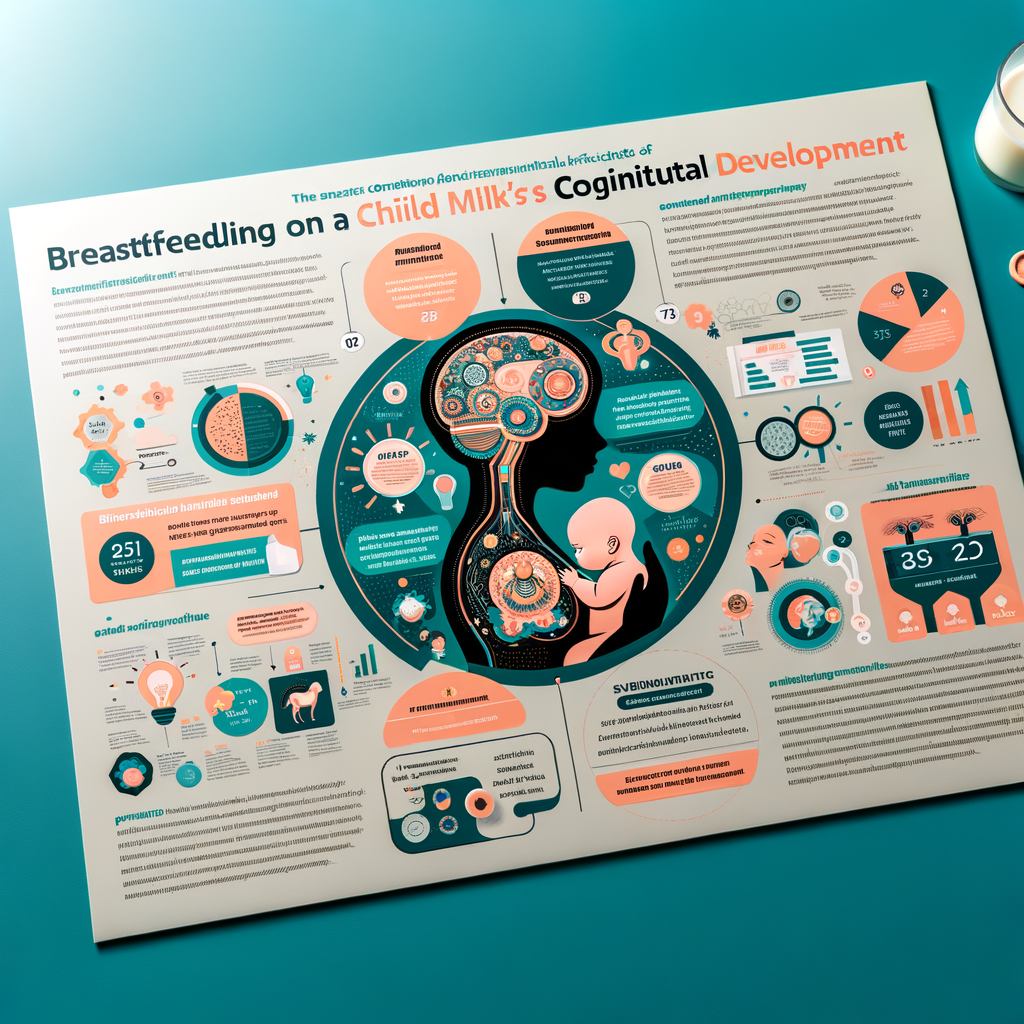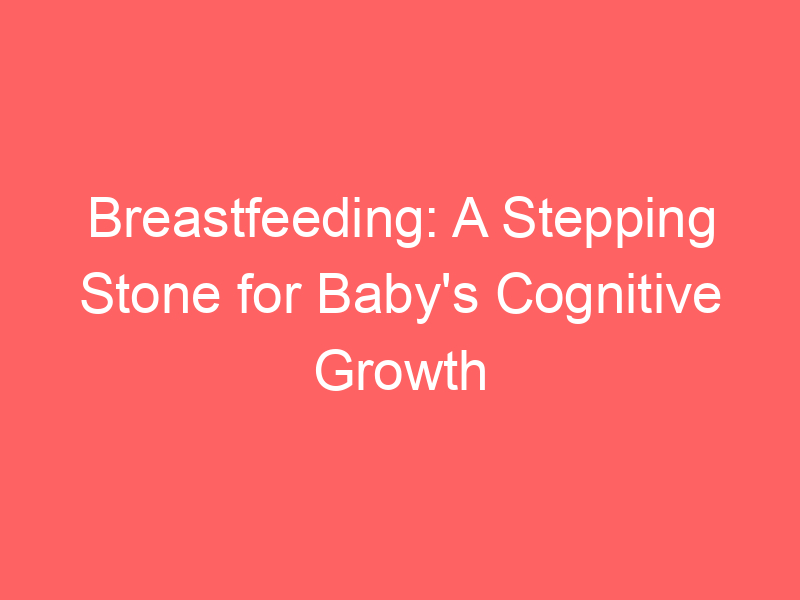Introduction to Breastfeeding and Cognitive Development
Welcome to our comprehensive guide on breastfeeding and cognitive development in children. This introductory section will help you understand the basics of these two important concepts. We will first delve into the concept of breastfeeding, followed by an exploration of cognitive development in children.
-
- Understanding the concept of breastfeeding
Breastfeeding is a natural process where a mother feeds her baby with milk produced in her breasts. This is often the primary source of nutrition for newborns before they can eat and digest other foods. Breastfeeding has been recognized by health professionals worldwide as the best source of nourishment for infants, providing all the necessary nutrients in their most digestible form.
-
- Exploring the term cognitive development in children
Cognitive development refers to the process by which a child’s brain develops and matures, enabling them to think, understand, learn, and remember. It is a crucial part of a child’s overall development, influencing their ability to solve problems, make decisions, and interact with the world around them. Cognitive development in children is influenced by a variety of factors, including their physical health, environment, and educational experiences.
In the following sections, we will delve deeper into the benefits of breastfeeding, its impact on brain development, and how it contributes to a child’s intelligence and cognitive growth. We will also share case studies that demonstrate the link between breastfeeding and cognitive development. Stay tuned to learn more about the power of breastfeeding.
The Benefits of Breastfeeding
When it comes to feeding your newborn, breastfeeding is often considered the best option. But why is that? Let’s explore the numerous benefits of breastfeeding, which can be categorized into three main areas: nutritional, emotional, and health benefits.
-
- Nutritional benefits of breastfeeding
Breast milk is often referred to as the ‘perfect food’ for a baby’s digestive system. It contains the vitamins and nutrients that a newborn needs, and all in the right proportions. Its composition even changes according to the baby’s changing needs, especially during the first month of life. For instance, breast milk produced for a newborn is different from the milk produced for a 3 or 4-month-old baby. This is something that formula milk cannot replicate.
-
- Emotional benefits of breastfeeding
Breastfeeding creates a close bond between mother and baby. The skin-to-skin contact can boost the mother’s oxytocin levels, a hormone that helps milk flow and can calm the mother. For the baby, this close contact is also comforting and can help them feel secure, promoting emotional well-being and development.
-
- Health benefits of breastfeeding
Breastfeeding not only provides the baby with necessary nutrients but also helps protect against many illnesses. According to Wikipedia, breastfed infants have fewer deaths due to lower respiratory tract infections than formula-fed infants. Breastfeeding has also been linked to higher intelligence scores in later childhood and adolescence. Furthermore, it can reduce the mother’s risk of certain health problems, including breast cancer, ovarian cancer, and type 2 diabetes.
In conclusion, the benefits of breastfeeding extend well beyond basic nutrition. In addition to providing all the necessary nutrients in their most digestible form, breastfeeding promotes a unique and powerful bond between mother and baby. It also offers health benefits for both, making it an excellent choice for new mothers. 
Impact of Breastfeeding on Brain Development
When it comes to the growth and development of a child, breastfeeding plays a crucial role. It’s not just about providing nutrition, but also about fostering brain development. Let’s delve deeper into this topic.
-
- Role of breast milk in brain development
Breast milk is a rich source of nutrients that are essential for the brain development of a child. It contains DHA (docosahexaenoic acid), a type of Omega-3 fatty acid that is a primary structural component of the human brain and cerebral cortex. DHA helps in the formation of brain cells and improves neural connections, leading to better cognitive abilities in children. Moreover, breast milk also contains other vital nutrients like proteins, vitamins, and minerals that contribute to the overall brain development of the child.
-
- How breastfeeding contributes to mental development
Breastfeeding is not just about the transfer of nutrients, but also about the bonding between the mother and the child. This bonding helps in the emotional development of the child, which is a crucial aspect of mental development. Studies have shown that children who were breastfed have better emotional health and are more resilient to stress and anxiety. Moreover, the act of breastfeeding also stimulates the child’s brain, leading to better cognitive development. For instance, a study found that children who were breastfed scored higher on IQ tests compared to those who were not.
In conclusion, breastfeeding has a profound impact on a child’s brain development, contributing not only to their cognitive abilities but also to their emotional health. It’s a natural and effective way to ensure that your child gets the best start in life.
Breastfeeding and Child Intelligence
One of the most fascinating aspects of breastfeeding is its potential impact on a child’s intelligence. Numerous studies have explored this topic, and we’re going to delve into some of the key findings.
-
- Studies linking breastfeeding to higher IQ
Several research studies have shown a correlation between breastfeeding and higher IQ scores in children. For instance, a study published in The Lancet, a well-respected medical journal, found that children who were breastfed for at least a year scored 4 points higher on IQ tests compared to those who were not breastfed. Another study, published in the Journal of the American Medical Association, found a similar trend, with breastfed children scoring 3 points higher on average.
-
- Understanding the relationship between breastfeeding and intelligence
The relationship between breastfeeding and intelligence is complex and not fully understood. However, some researchers believe that the nutrients found in breast milk, such as long-chain polyunsaturated fatty acids, are essential for brain development. These nutrients, which are not typically found in formula milk, could potentially enhance cognitive development, leading to higher IQ scores.
While these studies do not prove that breastfeeding directly causes higher intelligence, they do suggest a strong correlation. It’s also important to note that many factors can influence a child’s intelligence, including genetics, environment, and education. Therefore, while breastfeeding may play a role in cognitive development, it is just one piece of the puzzle.
As always, it’s essential for parents to make informed decisions about breastfeeding based on their individual circumstances and the needs of their child. If you have any questions or concerns about breastfeeding and its potential impact on your child’s intelligence, we recommend speaking with a healthcare professional.
Breastfeeding and Cognitive Growth
One of the most fascinating aspects of breastfeeding is its potential to influence a child’s cognitive growth. This section will delve into how breastfeeding impacts cognitive skills and the long-term effects of breastfeeding on cognitive development.
- How breastfeeding impacts cognitive skills
Breastfeeding has been linked to the enhancement of cognitive skills in children. The nutrients found in breast milk, such as Omega-3 fatty acids, are known to aid in the development of the brain. According to Wikipedia, studies have shown that breastfed babies often score higher on IQ tests in childhood and adolescence. The act of breastfeeding also promotes bonding between mother and child, which can have positive effects on a child’s emotional development and cognitive skills.
- Long-term effects of breastfeeding on cognitive development
Research suggests that the benefits of breastfeeding extend well beyond the early years. The long-term effects of breastfeeding on cognitive development are profound. Children who were breastfed tend to perform better academically and are more likely to achieve higher educational levels. They also exhibit better memory and learning skills. A study found that adults who were breastfed as babies had higher intelligence scores and were more likely to earn a higher income.
In conclusion, breastfeeding plays a crucial role in a child’s cognitive growth. It not only provides the essential nutrients for brain development but also fosters emotional bonding, which can enhance cognitive skills. The long-term effects of breastfeeding on cognitive development are equally significant, with breastfed children often outperforming their peers in academic and professional arenas.
Case Studies: Breastfeeding and Cognitive Development
Let’s delve into some real-life case studies that highlight the connection between breastfeeding and cognitive development.
-
Case study 1: The Impact of Prolonged Breastfeeding on Cognitive Development
A study conducted by the World Health Organization found that children who were breastfed for longer periods showed higher intelligence scores. The study followed 1,000 children from birth until they were 6.5 years old. The results showed that children who were breastfed for more than a year had a 3.8 point increase in their IQ scores compared to those who were breastfed for less time.
-
Case study 2: The Relationship Between Breastfeeding and Academic Performance
A research study in Brazil tracked over 5,000 individuals from birth to adulthood. The study found that prolonged breastfeeding not only increased intelligence levels but also had a significant effect on earning ability. The study concluded that breastfeeding, irrespective of social class or income, had a positive impact on academic performance and long-term earning potential.
-
Case study 3: Breastfeeding and Social-Emotional Development
A study published in the Pediatrics Journal found that breastfeeding has a positive impact on children’s social and emotional development. The study followed 10,000 mothers and their children over a period of 5 years. It found that children who were breastfed had fewer behavioral problems and better social development skills compared to those who were not breastfed.
In conclusion, these case studies provide compelling evidence of the positive impact of breastfeeding on cognitive development, academic performance, and social-emotional development.
Conclusion: The Power of Breastfeeding
In conclusion, breastfeeding is a powerful tool that can significantly impact a child’s cognitive growth and overall development. It is a natural process that offers numerous benefits, not only for the baby but also for the mother.
-
- Summarizing the benefits of breastfeeding for cognitive growth
Throughout this article, we have explored the profound benefits of breastfeeding on a child’s cognitive growth. Research has shown that breastfed children often score higher on cognitive tests compared to their formula-fed counterparts. This is attributed to the unique composition of breast milk, which contains essential nutrients for brain development. Furthermore, the bonding experience during breastfeeding can also contribute to a child’s emotional and social development.
-
- Encouraging breastfeeding for optimal child development
Given the compelling evidence, we strongly encourage mothers to consider breastfeeding as a primary source of nutrition for their babies. It’s not just about the physical nourishment, but also the cognitive advantages that can set a solid foundation for a child’s future learning and development. However, it’s important to remember that every mother’s journey is unique, and there are various factors that can influence the decision to breastfeed. Support from healthcare professionals, family, and society can make a significant difference in promoting breastfeeding.
As we wrap up, let’s remember the power of breastfeeding and its potential to shape the cognitive future of our children. It’s a natural, cost-effective, and beneficial practice that can contribute to a healthier and smarter generation. Let’s embrace and promote it for the sake of our children’s optimal development.














